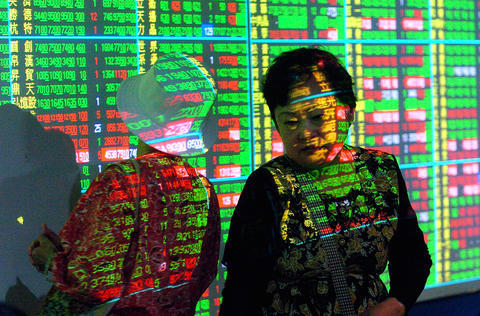Affected by Wall Street's overnight losses, the local bourse yesterday recorded its biggest plunge in more than three years with several bellwether stocks tumbling to their daily limit.
The benchmark TAIEX nose-dived 404.14 points, or 4.22 percent, to 9,162.28 on turnover of NT$295.54 billion (US$8.99 billion).
This was the steepest slide since March 22, 2004, when the market tumbled 455.17 points as nervous investors dumped shares in the wake of political uncertainty after the presidential election.

PHOTO: LO PEI-DER, TAIPEI TIMES
Yesterday also marked the biggest fluctuation among global benchmarks.
The fall in the domestic market was triggered by foreign investors' selloff, with net sales reaching a record NT$62.4 billion.
The drop wiped out US$32.5 billion in market value yesterday, Taiwan Stock Exchange data showed. About five stocks fell for every one that gained.
"Foreign investors' moves often match US stock markets' ups and downs. Their selloff [yesterday] dented local investors' confidence," Huang Shin-hui (黃熏輝), an analyst at Capital Securities Corp (群益證券) told the Taipei Times by telephone.
Taiwan Semiconductor Manu-facturing Co (TSMC,
TSMC's shares lost 6.2 percent to close at NT$64 on the Taiwan Stock Exchange yesterday. Its American Depositary Receipts (ADR) also dropped 6 percent overnight.
Hon Hai Precision Industry Co (鴻海精密), the nation's biggest electronics firm, also posted its biggest slide since June last year. Its shares fell 6.1 percent to NT$263.5.
Previous outperformers, including solar energy and property stocks, fell by their 7 percent daily limit, dealing a further blow to investor confidence in mid-day trading, Huang said.
He suggested that investors turn to China-concept stocks, passive components and LED-related shares.
The TAIEX dropped 4.4 percent this week -- its first weekly decline in 11 weeks -- paring its gain this year to 17 percent compared with a 9.9 percent gain in the Morgan Stanley Capital International Asia-Pacific Index.
"Crumbling global equity markets are hurting investor confidence,'' said Andrew Wang, who helps manage US$2.9 billion at Prudential Financial Securities Investment Trust Enterprise (保德信投信).
"This isn't the end of the bull market, though it must feel like that for some panicky investors," he said in Taipei.
Some analysts say the correction may be a good opportunity for bottom fishing in preparation for the index's recovery and anticipated surge past the 10,000 mark ahead of next year's presidential election.
"Following Friday's big fall, we think it will take longer -- one to two months when corporate financial reports are released -- before the index bounces back," Huang said.
Additional reporting by Bloomberg

Quanta Computer Inc (廣達) chairman Barry Lam (林百里) is expected to share his views about the artificial intelligence (AI) industry’s prospects during his speech at the company’s 37th anniversary ceremony, as AI servers have become a new growth engine for the equipment manufacturing service provider. Lam’s speech is much anticipated, as Quanta has risen as one of the world’s major AI server suppliers. The company reported a 30 percent year-on-year growth in consolidated revenue to NT$1.41 trillion (US$43.35 billion) last year, thanks to fast-growing demand for servers, especially those with AI capabilities. The company told investors in November last year that

Intel Corp has named Tasha Chuang (莊蓓瑜) to lead Intel Taiwan in a bid to reinforce relations between the company and its Taiwanese partners. The appointment of Chuang as general manager for Intel Taiwan takes effect on Thursday, the firm said in a statement yesterday. Chuang is to lead her team in Taiwan to pursue product development and sales growth in an effort to reinforce the company’s ties with its partners and clients, Intel said. Chuang was previously in charge of managing Intel’s ties with leading Taiwanese PC brand Asustek Computer Inc (華碩), which included helping Asustek strengthen its global businesses, the company

Taiwanese suppliers to Taiwan Semiconductor Manufacturing Co. (TSMC, 台積電) are expected to follow the contract chipmaker’s step to invest in the US, but their relocation may be seven to eight years away, Minister of Economic Affairs J.W. Kuo (郭智輝) said yesterday. When asked by opposition Chinese Nationalist Party (KMT) Legislator Niu Hsu-ting (牛煦庭) in the legislature about growing concerns that TSMC’s huge investments in the US will prompt its suppliers to follow suit, Kuo said based on the chipmaker’s current limited production volume, it is unlikely to lead its supply chain to go there for now. “Unless TSMC completes its planned six

TikTok abounds with viral videos accusing prestigious brands of secretly manufacturing luxury goods in China so they can be sold at cut prices. However, while these “revelations” are spurious, behind them lurks a well-oiled machine for selling counterfeit goods that is making the most of the confusion surrounding trade tariffs. Chinese content creators who portray themselves as workers or subcontractors in the luxury goods business claim that Beijing has lifted confidentiality clauses on local subcontractors as a way to respond to the huge hike in customs duties imposed on China by US President Donald Trump. They say this Chinese decision, of which Agence